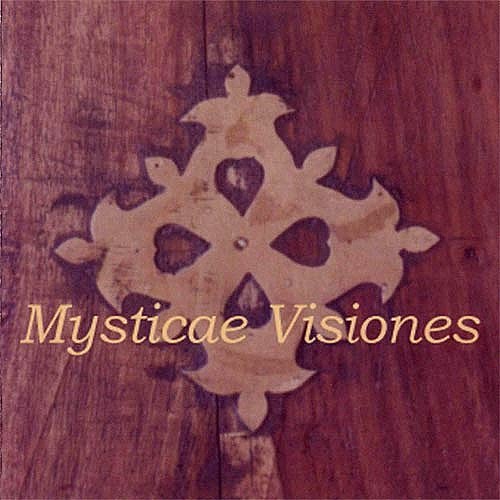|
|
|
01 |
Mysticae Visiones - I Prologue |
|
|
|
04:53 |
|
|
02 |
Mysticae Visiones - II Birth And Childhood ....The Discovery |
|
|
|
02:27 |
|
|
03 |
Mysticae Visiones - III Youth .... The Dream |
|
|
|
02:09 |
|
|
04 |
Mysticae Visiones - IV Manhood .... The Construction |
|
|
|
01:34 |
|
|
05 |
Mysticae Visiones - V Reflection |
|
|
|
01:47 |
|
|
06 |
Mysticae Visiones - VI Death |
|
|
|
02:35 |
|
|
07 |
Mysticae Visiones - VII Transition |
|
|
|
03:39 |
|
|
08 |
Mysticae Visiones - VIII Meditation |
|
|
|
05:04 |
|
|
09 |
Mysticae Visiones - IX First Heaven .... Punishement |
|
|
|
03:43 |
|
|
10 |
Mysticae Visiones - X Second Heaven .... Reward |
|
|
|
03:20 |
|
|
11 |
Mysticae Visiones - XI Thrid Heaven .... The Beckoning |
|
|
|
01:36 |
|
|
12 |
Mysticae Visiones - XII Epilogue |
|
|
|
02:57 |
|
|
13 |
The River |
|
|
|
14:55 |
|
|
|
| Studio |
Kotebel's project studio |
| Country |
Spain |
| Original Release Date |
2001 |
| Cat. Number |
008 |
| UPC (Barcode) |
742630044022 |
| Packaging |
Jewel Case |
| Spars |
DDD |
| Sound |
Stereo |
|
|
|
Kotebel - Mysticae Visiones
Country of Origin: Spain
Format: CD
Record Label: Musea Records
Catalogue #: FGBG 4402.AR
Year of Release: 2001
Time: 50:43
Tracklist: Mysticae Visiones : Prologue; Birth & Childhood... The discovery; Youth... The dream; Manhood... The construction; Reflection; Death; Transition; Meditation; First Heaven...Punishment; Second Heaven...Reward; Third Heaven...The beckoning; Epilogue (35:48), The River (14:55)
A seconding offering from the pen of Carlos Plaza, the man behind the Mysticae Visiones album, as writer, arranger and producer of this, the second release by Kotebel. Hailing from Spain, the Kotebel project offer us symphonic progressive rock with a distinct leaning towards the classical side, although this may be an over simplification of an album that covers many styles and influences. A clever use of flute and cello combined with electronic and acoustic keyboards; guitars; human voices and drums that give this music an interesting and unique quality.
The album opens with a lengthy piece of some thirty five minutes and supports musically, a metaphysical theory of experienced feelings and sensations from birth to beyond death. Mysticae Visiones is subdivided into twelve pieces each of which depicts changes in state - an intelligently thought out concept, well executed here in music.
Prologue, the opening tune, is a haunting piece created by random notation on synth and a string chord structure based around a flattened fifth interval. A female vocal melody is added and with the inclusion of the other instruments builds dramatically until its release into the sharply contrasting Birth and Childhood, a gentle piece played mainly on piano and acoustic guitar. This again nicely segues the dreamy third track Youth with the re-introduction of the beautifully haunting melody vocalised by Carolina Prieto. It is this recapitulation of the melodies, themes and patterns throughout Mysticae Visiones which reinforces the classical notion of the music.
So the album opens very dramatically with good usage of highs and lows to create a strong symphonic framework strengthened by the choice of the principal instruments, mainly the flute and cello. It is here that the music changes and the tempo lifts during Manhood, a jazzy track with some inspirational flute from Omar Acosta and a nicely constructed violin solo, excellently executed on keyboard. From this we are linked to one of the highlights from the album, albeit one of the shorter pieces, in Reflection and features the guitar of Cesar Garcia, shades of early Genesis were brought to mind.
Track six onwards deals with those states from death to a point at which "evolution as humans is completed when no further desire for material action is felt in the third heaven....". I did say this was a deep album, but the music does capture the ideas it purports to deal with. There are numerous moments of genius throughout these tracks especially from Carlos Plaza, his keyboard sounds and style during First Heaven were very reminiscent of Keith Emerson at his best. Not wishing to repeat what has already been said Mysticae Visiones continues to it's conclusion with all the above ingredients in abundance. Although I would comment that the drum and percussion parts were good, as in Transition, I did think that an actual drummer would have elevated the album as a whole.
The second major piece on the CD is The River which although in keeping with the previous epic, has slightly different variations, with a mixture of latin rhythms - I may have detected influences from Al Di Meola here - and combining unusual, oriental sounding keyboard timbres. The inspiration behind this can be found in an extract by Hermann Hesse entitled Siddhartha and an interpretation of which can be found in the ideas embedded in Kotebel's powerful symphonic music.
So you may have gathered that Mysticae Visiones is not a simple album - in fact it is complex and challenging, possibly a little too dramatic and somewhat "heavy-weight". It appealed more to the musician in me than the listener, but having said this, it is also very enjoyable and surprisingly relaxing, well once I had stopped analysing it for the purposes of this review. Possible other guides to similar styles not mentioned above might be found in The Enid and Gentle Giant, however click the link in the "Samples" box above and hear for yourself.
Conclusion: 7 out of 10.
Bob Mulvey
